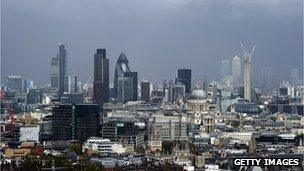Jail reckless bankers, standards commission urges
- Published

The commission was highly critical of aspects of the banking industry
Senior bankers guilty of reckless misconduct should be jailed, a long-awaited report on banking commissioned by the government has recommended.
The cross-party Parliamentary Commission on Banking Standards' fifth report said bankers should in future be accountable for their actions.
It also said some bonuses should be withheld for up to 10 years.
The Treasury welcomed the report, calling it "a very impressive piece of work".
It promised to provide a response before the summer recess.
The commission was set up by Chancellor George Osborne last year after a number of scandals involving the industry.
The 571-page report also called on the government , externalto review alternatives for selling off the Royal Bank of Scotland (RBS), including breaking it up, and demanded action to make the banking market more competitive.
Criminal liability
The robustly-worded report said: "Too many bankers, especially at the most senior levels, have operated in an environment with insufficient personal responsibility.
"Senior executives were aware that they would not be punished for what they could not see and promptly donned the blindfolds.
"Where they could not claim ignorance, they fell back on the claim that everyone was party to a decision, so that no individual could be held squarely to blame - the Murder on the Orient Express defence."
The report advocated:
senior bankers should be assigned clear personal responsibilities, with the legal onus on them to show they have done all that is reasonably required
recklessly disregarding these responsibilities should be made a criminal offence - including a possible prison sentence
senior bankers should adhere to a new set of banking standards set by regulators
bonus pay for bankers should be deferred for up to 10 years and cancelled if a banker misbehaves
banks should be legally required to put financial safety ahead of shareholder interests
Shadow chancellor Ed Balls said the report offered a blueprint for the "radical change" needed. He said: "We need our banks working well in the future - this report shows us what to do."
Liberal Democrat peer Lord Oakeshott said: "Why are there no banged-up bankers? That's what most people want to know after the last five years of scandals and shame."
Ed Balls "This report sets out the blueprint on pay, transparency and accountability"
However, former RBS chairman and chief executive Sir George Mathewson questioned the plan to defer bonuses for 10 years.
He told the BBC: "I find that a little strange. If you are going to have bonuses, they are to incentivise behaviours. Ten years out is not an easy way to imagine incentivisation occurring."
'Male-dominated'
The report called for more to be done to boost competition among banks, including two further investigations.
One, by a government panel of experts, would look at how to make it easier for people to transfer their bank accounts, while the other would be a full investigation of retail banking and small business lending by the Competition and Markets Authority (CMA).
The CMA is due to be launched next April, and will replace the Office of Fair Trading (OFT) and the Competition Commission.
Following the publication of the parliamentary commission's report, the OFT said it was "bringing forward" an inquiry into the provision of banking services to small and medium-sized businesses.
"Our review of SME banking is part of an ongoing planned programme of work in this area to allow the Competition and Markets Authority to decide whether or not to make a market investigation reference by 2015," said OFT chief executive Clive Maxwell.
Consumer watchdog Which? welcomed the proposals, saying it could herald "the big change in banking that consumers have been crying out for".
But the group said more needed to be done to change banking culture and highlighted the male-dominated culture on trading floors, it said banks should be forced to take action if there was a significant imbalance.
On RBS, the committee only said that the government should formally consider alternative options for the nationalised bank by September.
The report also called for an end to the government's purportedly "arms-length" ownership of RBS and Lloyds via the holding company UKFI - an arrangement set up under Gordon Brown and described as a "fig leaf" disguising the government's increasing interference in the running of the two banks, especially RBS.
'Special measures'
The committee also criticised the failure of regulators to spot the risks building up in the financial system prior to 2008, demanding "the replacement of mechanical data collection and box ticking by a much greater emphasis on the exercise of judgement".
Senior regulators should also be personally accountable, ultimately to Parliament, for their oversight of the banks.
The report recommended that each bank's board should be required to institute procedures to protect whistle-blowers - employees who want to flag up misconduct to the regulators.
The Financial Services Authority, the overall banking regulator up to and during the financial crisis, has been split into two separate units - the Financial Conduct Authority, which polices banker behaviour, and the Bank of England's Prudential Regulation Authority, which ensures the banks do not take excessive risks.
If either regulator spots a pattern of shoddy standards at a bank, the commission said that the two should be able to put the bank into "special measures".
The committee repeated its demand that the chancellor allow regulators to set a more conservative "leverage ratio" for the banks.
The leverage ratio is the minimum amount of loss-absorbing capital that a bank must hold, as a percentage of its total loans and investments.
Mr Osborne has said the limit should be set at 3%, in line with a new international requirement from the Basel committee of central bankers. But the committee has the figure should be much higher.